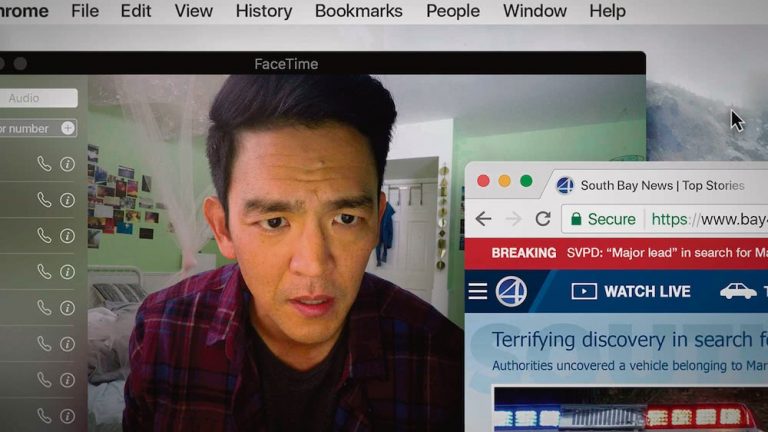Commercial cinema has by and large handled the omnipresence of social media in the lives of young people with the usual reactionary paranoia that society at large often adopts in the face of change. To this end, several horror films entirely ‘set’ on computer screens have essentially transposed the tropes of the slasher film into the digital realm.
In the tradition of slasher characters, teens in these movies have sex on the brain 24/7 and their lives are animated by the drama and horrors common to the typical on-screen American college life: reputation comes before homework, bullying is practically a given, and humiliation a constant threat.
The physical distance and veil of anonymity allowed by technology and social media simply exacerbate those hostile attitudes at fever pitch.
These facts were used most effectively in the wildly commercial successful film Unfriended, which, despite taking a supernatural direction, started from the premise of a classmate committing suicide after being humiliated online.
One thing that is particularly refreshing about Aneesh Chaganty’s Searching is its relative resistance to these reactionary impulses and its more nuanced portrayal of the internet as a sort of double-edged sword, with good and bad sides.
When Margot (Michelle La), the 16 year-old daughter of David (John Cho) goes missing, the internet is the father’s only tool for trying to find her — a blessing for him, but one tainted by the grim realisation of how easily one can hack into somebody’s computer, Facebook account, and more.
When the news media catches up with his story, so does social media, and the viral hashtag #FindMargot inevitably brings out unpleasant and hypocritical commenters, with negative real-life consequences.
Love Music?
Get your daily dose of metal, rock, indie, pop, and everything else in between.
Watch the Searching trailer below
https://www.youtube.com/watch?v=3Ro9ebQxEOY
But rather than focus on this mob mentality and on the effect of public opinion, Chaganty’s film maintains a moving human dimension and concentrates largely on David and Margot’s relationship before and after crisis hits. When David, tired and desperate, attacks a schoolmate of Margot’s for posting an inappropriate status on Facebook, we are shown a Youtube video of the accident, but the gimmick does not take away from the dramatic implication of the event.
Technology and social media in Searching are simply tools used to construct a conventional but expertly crafted drama / thriller that relies heavily on characters.
The film opens on a video screen capture (or screencast) from the computer of David’s wife Pamela (Sara Sohn) retelling the story of this family from the birth of Margot to the premature death of Pamela from lymphoma. Off-screen, Pamela is uploading pictures and videos of Margot’s first words, first piano lessons, and other such pivotal moments, and as time fast-forwards, the software of the computer goes from older versions of Windows to the now mainstream Mac OS.
It’s a canny and innovative effect, demonstrative of Chaganty’s invention when it comes to actually using the tools he is presented with.
It is touching to see what the late Pamela used the internet and her computer for: like most parents who were not born with these machines, she mostly used this technology to organise her IRL life. For Margot, by contrast, the internet has become a means to escape her painful reality.
As the film goes on, David comes to realise just how deeply her mother’s passing has affected her, and how she sought solace in online friendships rather than in her distant, uncommunicative father.
But Margot isn’t into the most extreme or obscene aspects of social media, either. Like most sad teens, she has a blog on Tumblr, where users can take refuge in an online world of their own creation and a community of their own choosing. Even the live video website she used, a more intrusive networking website, seems relatively harmless.

However, and more than once, David is led down a much more extreme, bone-chilling paths in his investigation, and while some of them are valid, many turn out to be red herrings stalling his search and affecting his mindset.
In most thrillers, when a lead is revealed to be entirely false and to have no bearing on the story at all, the viewer feels cheated – it seems like a cheap way for the director to create suspense and extend the film’s runtime.
Here, by contrast, such anti-climatic revelations brilliantly highlight the way in which the internet encourages our paranoid impulses. Unable by law to assist the policewoman assigned to the case, David has little reason to leave the house; in his obsessive search through Margot’s web presence, he essentially spends his entire time on his computer –something we all know is not very good for one’s personal well-being.
These moments are also neat feats of character-building, where David’s reasonable, ‘cool dad’ facade is challenged by an almost unhinged sense of panic. John Cho’s expressive and nuanced performance – while almost entirely playing out on his face, seen via the FaceTime app on his laptop – is genuinely moving and, together with the film’s focus on characters, helps carry interest well beyond that of the central gimmick.
Watching the film does not feel like staring at a computer screen for 100 minutes; Searching is a true cinematic experience.


































